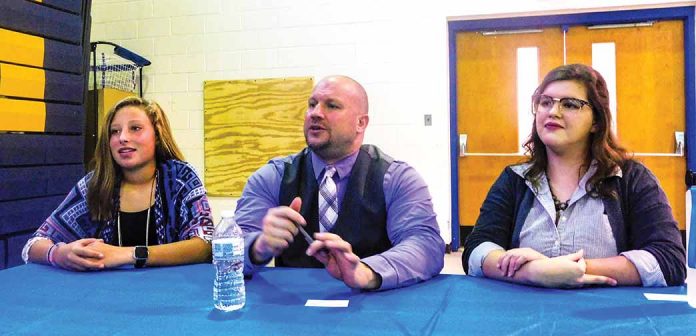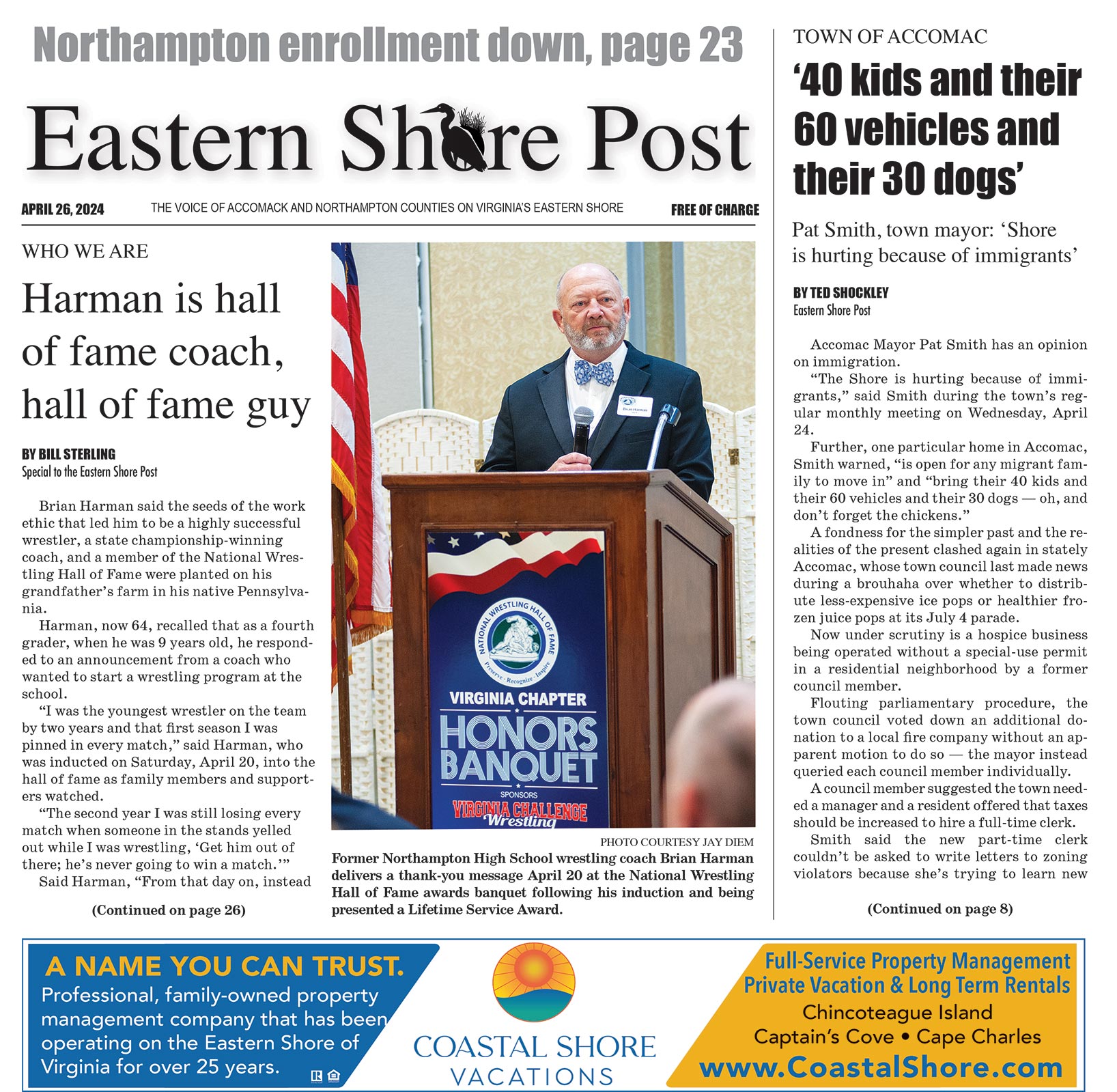
By Stefanie Jackson – Northampton Middle School teacher Jessica Merando and Principal Ron Yorko are making a difference at their school by introducing a new program that gives students incentives for good behavior and having a positive influence on school climate.
Handing out referrals and punishing bad behavior used to be the standard method of discipline at Northampton Middle School.
“We noticed that wasn’t really working,” Yorko said at the Northampton County Education Foundation’s State of the Schools forum Oct. 8.
He concluded the school must be less “reactive” and more “proactive” about student behavior.
Northampton Middle School is now participating in a new wave of an ongoing nationwide school movement, Positive Behavior Interventions and Supports (PBIS), influenced by the U.S. Individuals with Disabilities Education Act of 1997 and funded in part by the U.S. Department of Education.
The new PBIS program awards students for good behavior using a point system adapted for the digital age.
Merando, the program’s chair, said the school’s previous PBIS award system was flawed because it incorporated materials such as paper and ink stampers, which were easily lost by students.
She discovered the new system at a teacher conference.
Thanks to the new PBIS app, teachers and students can go online and track how many points they have awarded or received.
Teachers can award points by scanning a student’s ID card or logging onto the app that is accessible by computer or smartphone.
Students can use their points to purchase items from the school store.
Not only does the system incentivize positive academic and social behaviors like completing school work on time and lending a helping hand to teachers and other students, it teaches kids how to budget, Yorko said.
Students can save up their points to buy a more expensive item in the school store or win a prize in a school auction or raffle later in the year.
Major prizes have included gaming systems and AirPods (wireless earbuds).
When eighth grade participation in PBIS slacked off, teachers surveyed the students and learned that sometimes positive student behavior is motivated by special privileges rather than tangible prizes.
Yorko was hesitant at first to allow kids to use points to buy privileges like using a cellphone during lunch, but he is now onboard with it, he said.
Yorko reported 80% student “buy-in” or participation in PBIS.
For students who don’t respond well to the PBIS program, there is a second-tier behavior intervention, Check-In Check-Out, in which students check in daily with mentors who help them monitor their behavior. Any teacher or school staff member may be a mentor.
The overall goal of PBIS is “to improve student success,” both behaviorally and academically, Yorko said.
Northampton Middle School’s PBIS motto is “Be Safe, Be Respectful, Be Responsible.”
The school also created a PBIS matrix, a set of behavior expectations, “so students knew exactly what was expected of them in the classrooms, in the cafeteria, in the restrooms, as well as on the bus,” Yorko said.
Teachers used interactive lesson plans and taught the expectations during the first week of school.
“Students love the opportunity to earn points through good behavior … and buy things like candy, school supplies, sweatshirts, sweatpants, or even sports equipment,” said eighth grader Ryan Jones, president of the NMS Student Government Association.
“Overall, this program is making a positive impact on our middle school.” It gives “daily reminders to stay positive, stay focused on the good, and display kindness to your classmates and teachers,” she said.
“We’re going to continue to make you proud of our Northampton Middle School.”
Northampton Middle School has never been fully accredited since the state accreditation system began in 1999. Achieving the goal of full accreditation “starts with changing the atmosphere” and partnering that with “good, sound, instructional delivery,” Yorko said.
Parents and other stakeholders participated in a roundtable discussion of the new PBIS program with Yorko, Merando, and Jones.
Mindy Fleetwood approved of the program and asked about teacher buy-in.
The panel said the majority of teachers are using the program consistently. They had some concern about the participation of teachers shared by the middle and high school, but they had plans to address that issue, they said.
Kate Latham also liked the concept and suggested the program should have a catchier name than simply “PBIS.” She volunteered to help with “branding” the new program, and the panel welcomed the offer.
NMS also welcomes prize donations to ensure the PBIS program’s continued success.
A grant paid for the new PBIS software, but the prizes are donated by parents and other community members.
Yorko said the prize list will be published on the Northampton Middle School website.
Northampton High School
Northampton High School Principal Michael Myers has a different method of implementing PBIS.
High school students receive “positive referrals” for good behavior. The positive referrals are like discipline referrals except they call attention to positive behaviors.
Students are sent to the office and receive awards such as candy.
Myers makes sure students (and teachers) are publicly recognized for their achievements. Northampton High School has a Student of the Month and a Teacher of the Month program.
The high school also holds assemblies recognizing students who have made honor roll or scored high on the SOLs (Standards of Learning tests).
The high school and middle school don’t just help students with behavior and academic issues.
Northampton High School has started a clothes closet that allows students to borrow clean clothes in good condition. Students will also be able to borrow formal attire such as suits and prom dresses.
Washers and dryers will be available for cleaning the returned items.
After learning that there is only one operating laundromat in Northampton County, the middle school applied for a Washington Redskins grant for more washers and dryers.
The school will be notified by Oct. 31 if it is awarded the grant.
Kiptopeke Elementary School
Kiptopeke Elementary School Principal Subrina Parker is proud of the school’s mentoring program for fifth and sixth-grade boys, Ties with the Guys. The program fosters relationships with mentors and teaches social skills and – as the name suggests – how to tie a necktie.
Ties with the Guys has doubled its numbers. The program started in 2016 with 13 members meeting once a month; now it has 31 members who meet every two weeks.
Occohannock Elementary School
Last year, Occohannock Elementary School Principal Shirley Auguste began a successful after-school tutoring program to prepare students for the SOLs. Out of 88 students invited, 85 attended, resulting in a participation rate of nearly 97%.
The group met twice a week, from 3:30 p.m. to 5 p.m. Snacks were served, and students worked in small groups of four to eight and used computers.
Last year, the tutoring sessions began in February, but this year, Auguste wants to start them in November.
She also works to build relationships with students and teachers. Even teachers get prizes at Occohannock. Auguste enjoys working with the school’s social committee and PTA and holding principal’s lunches with students.
“We talk a lot about what we can do for the children, and that is absolutely correct, because children are our future leaders,” Auguste said.
“We need to make sure … they have a solid foundation in their education: they know how to read, they know how to write, and they know how to comprehend, and they know how to speak.”
Students should “understand that no matter where (they) come from or who they are, what their background is, that they are special and they’re going to be great.”
For more information about donating money or supplies to Northampton public school projects or classrooms, visit the Northampton County Education Foundation website at ncedufoundation.com


